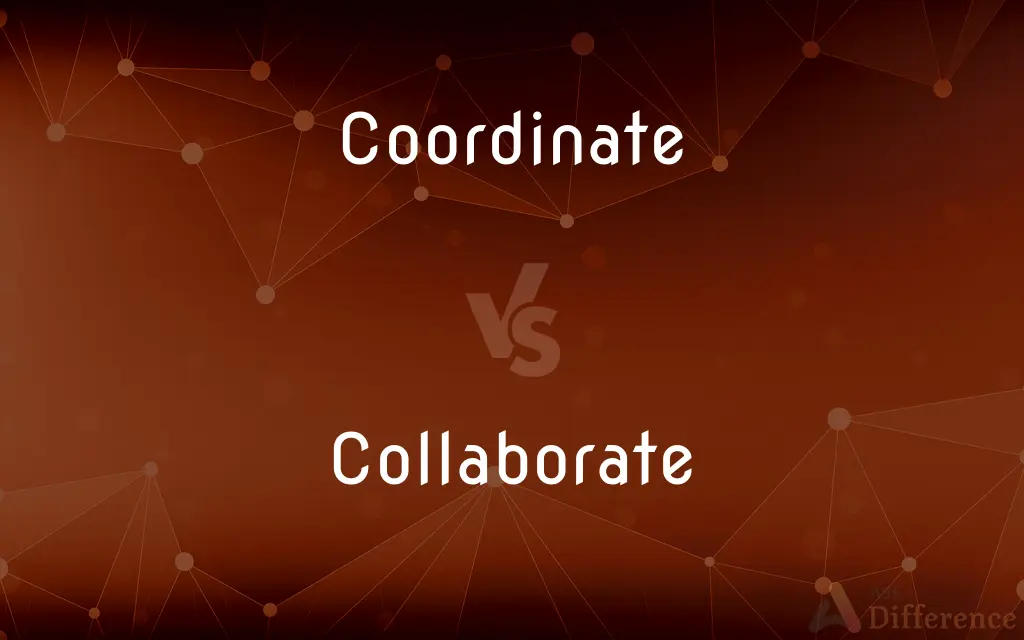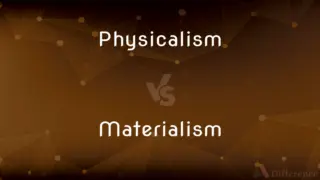Coordinate vs. Collaborate — What's the Difference?
By Tayyaba Rehman & Fiza Rafique — Updated on March 29, 2024
Coordinate involves organizing activities for efficiency, while collaborate emphasizes working together to achieve a goal.

Difference Between Coordinate and Collaborate
Table of Contents
ADVERTISEMENT
Key Differences
Coordinate refers to the process of organizing people, tasks, or events systematically to ensure smooth operation or execution. This involves planning, scheduling, and arranging resources and activities to achieve a specific objective, with a focus on efficiency and order. On the other hand, collaborate involves two or more individuals or groups working together towards a common goal, emphasizing the collective effort, sharing of ideas, resources, and responsibilities to achieve something that might be difficult to accomplish individually.
While coordination might require a hierarchical structure where someone is in charge of assigning tasks and ensuring they fit together properly, collaboration thrives in a more egalitarian environment where everyone's input is valued equally, and decision-making is often shared. Coordination is about the efficient and effective arrangement of different parts to work together seamlessly, whereas collaboration is about partnership, mutual understanding, and joint effort.
In coordination, the key focus is on the logistical aspects of bringing together various components of a project in a way that maximizes efficiency and minimizes overlap or redundancy. Collaborating, however, places a greater emphasis on the creative and innovative outcomes that can arise from a group's shared efforts, suggesting a more integrated and synergistic approach to achieving objectives.
Effective coordination can ensure that a project is completed on time and within budget, but it may not always foster a sense of teamwork or innovation. Collaboration, while potentially more time-consuming and requiring more effort in communication, can lead to more innovative solutions and a stronger sense of community and shared purpose among participants.
The success of many projects often depends on a combination of both coordinating and collaborating. For instance, in a complex project, coordination can set the framework within which collaboration takes place, ensuring that the collaborative efforts are focused and aligned with the project's goals. This demonstrates how these two approaches, while distinct, can complement each other in achieving a shared objective.
ADVERTISEMENT
Comparison Chart
Definition
Organizing people, tasks, or events systematically for efficiency.
Working together with others towards a common goal, emphasizing joint effort and sharing of ideas.
Focus
Efficiency and order in planning and execution.
Partnership, mutual understanding, and collective innovation.
Structure
Often requires a hierarchical organization with designated leaders and defined roles.
Thrives in egalitarian settings with shared decision-making and equal contribution.
Key Attributes
Planning, scheduling, arranging resources.
Sharing ideas, resources, responsibilities, and creating together.
Outcome
Ensures projects are completed on time and within budget.
Leads to innovative solutions and a strong sense of community among participants.
Compare with Definitions
Coordinate
Requires clear communication and organizational skills.
Coordinating a large project demands clear communication channels and precise planning.
Collaborate
The process of working jointly on an activity or project.
Artists from different disciplines collaborated to create an interdisciplinary artwork.
Coordinate
The act of arranging elements or activities in a harmonious order.
The event planner coordinated the wedding, ensuring that the ceremony and reception flowed seamlessly.
Collaborate
Emphasizes teamwork and partnership.
Collaborating on the presentation, they combined their expertise to cover all topics comprehensively.
Coordinate
To bring various components together to work efficiently.
She coordinated the team's efforts by assigning specific tasks to each member.
Collaborate
Requires open communication and mutual respect among participants.
Effective collaboration is built on trust and open dialogue between team members.
Coordinate
Often entails leadership and decision-making capabilities.
His ability to coordinate complex tasks made him an excellent project manager.
Collaborate
Can lead to innovative outcomes and solutions through the combination of diverse perspectives.
Their collaboration led to groundbreaking solutions that neither could have achieved alone.
Coordinate
Involves systematic organization for achieving efficiency.
Effective coordination of the conference required meticulous scheduling of speakers and sessions.
Collaborate
Involves sharing ideas, resources, and efforts to achieve a common goal.
The two companies collaborated on research to develop a new technology.
Coordinate
Bring the different elements of (a complex activity or organization) into a harmonious or efficient relationship
He had responsibility for coordinating London's transport services
Collaborate
To work together, especially in a joint intellectual effort.
Coordinate
Form a coordinate bond to (an atom or molecule)
The sodium atom is coordinated to two oxygen atoms
Collaborate
To cooperate treasonably, as with an enemy occupation force in one's country.
Coordinate
Equal in rank or importance
Cross references in the catalogue link subjects which may be coordinate
Collaborate
To work together with others to achieve a common goal.
Let's collaborate on this project, and get it finished faster.
Wikipedia is a website where anyone can collaborate.
Coordinate
Denoting a type of covalent bond in which one atom provides both the shared electrons.
Collaborate
To voluntarily cooperate treasonably, as with an enemy occupation force in one's country.
If you collaborate with the occupying forces, you will be shot.
Coordinate
Each of a group of numbers used to indicate the position of a point, line, or plane.
Collaborate
To work together with another toward a common goal, especially in an intellectual endeavor; as, four chemists collaborated on the synthesis of the compound; three authors collaborated in writing the book.
Coordinate
Matching items of clothing
Matching accessories provide a complete ensemble of colour coordinates
Collaborate
To willingly cooperate with an enemy, especially an enemy nation occupying one's own country.
Coordinate
(Mathematics)Any of a set of two or more numbers used to determine the position of a point, line, curve, or plane in a space of a given dimension with respect to a system of lines or other fixed references.
Collaborate
Work together on a common enterprise of project;
The soprano and the pianist did not get together very well
We joined forces with another research group
Coordinate
Coordinates Informal Directions
Give me some coordinates so I can find my way.
Collaborate
Cooperate as a traitor;
He collaborated with the Nazis when they occupied Paris
Coordinate
Coordinates A set of articles, as of clothing or luggage, designed to match or complement one other, as in style or color.
Coordinate
Of equal importance, rank, or degree
Jobs with coordinate responsibilities.
Coordinate
(Grammar)Having equal syntactic status; not subordinate
Coordinate phrases.
Coordinate
(Mathematics)Of or based on a system of coordinates.
Coordinate
To cause to work or function in a common action or effort
Coordinating the moving parts of a machine.
Coordinate
To make harmonious; harmonize
Coordinate the colors of a design.
Coordinate
(Grammar)To link (syntactic units) at an equal level.
Coordinate
To work or function together harmoniously
A nursing staff that coordinates smoothly.
Coordinate
To form a harmonious combination; match
Shoes that coordinate with the rest of the outfit.
Coordinate
Of the same rank; equal.
Two coordinate terms
Coordinate
A number representing the position of a point along a line, arc, or similar one-dimensional figure.
Give me your coordinates and we'll come and rescue you.
Coordinate
Something that is equal to another thing.
Coordinate
Coordinated clothes.
Coordinate
(transitive) To place in the same order or rank.
Coordinate
(ambitransitive) To synchronize (activities).
It can be difficult to coordinate movement of both legs after an operation.
I was playing tennis for the first time, and it was difficult to coordinate.
Coordinate
(ambitransitive) To match (objects, especially clothes).
The outfit you're wearing doesn't coordinate.
Coordinate
Equal in rank or order; not subordinate.
Whether there was one Supreme Governor of the world, or many coördinate powers presiding over each country.
Conjunctions joint sentences and coördinate terms.
Coordinate
A thing of the same rank with another thing; one two or more persons or things of equal rank, authority, or importance.
It has neither coördinate nor analogon; it is absolutely one.
Coordinate
Lines, or other elements of reference, by means of which the position of any point, as of a curve, is defined with respect to certain fixed lines, or planes, called coördinate axes and coördinate planes. See Abscissa.
Coordinate
A number that identifies a position relative to an axis
Coordinate
Bring order and organization to;
Can you help me organize my files?
Coordinate
Bring into common action, movement, or condition;
Coordinate the painters, masons, and plumbers
Coordinate his actions with that of his colleagues
Coordinate our efforts
Coordinate
Be co-ordinated;
These activities co-ordinate well
Coordinate
Bring (components or parts) into proper or desirable coordination correlation;
Align the wheels of my car
Ordinate similar parts
Coordinate
Of equal importance, rank, or degree
Common Curiosities
How do coordination and collaboration contribute to the success of a project?
Coordination ensures that tasks are efficiently organized and executed, while collaboration fosters innovation and strengthens team dynamics.
Can coordination occur without collaboration, and vice versa?
Yes, it's possible to coordinate tasks without collaborative efforts, and people can collaborate without a coordinated structure, but combining both often leads to better outcomes.
Is a leader always necessary in collaboration?
Not necessarily; collaboration often thrives in settings where decision-making and contributions are shared among all participants.
Can a project involve both coordination and collaboration?
Yes, many projects benefit from both coordination (for efficiency and organization) and collaboration (for innovation and teamwork).
What skills are important for effective coordination?
Organizational, communication, and leadership skills are crucial for effective coordination.
What makes collaboration successful?
Collaboration succeeds through open communication, mutual respect, and the integration of diverse perspectives and expertise.
What is the difference between coordinating and collaborating?
Coordinating is about organizing activities or tasks for efficiency, while collaborating is about working jointly with others towards a common goal.
What are the challenges of coordinating and collaborating in large teams?
Challenges include maintaining clear communication, ensuring everyone's contributions are valued, and aligning individual tasks with the overall goal.
How do digital tools facilitate coordination and collaboration?
Digital tools can streamline coordination through scheduling and task management, and enhance collaboration via platforms that support real-time communication and document sharing.
How can a team balance the need for coordination with the benefits of collaboration?
Teams can set clear objectives and roles for coordination while fostering an open, inclusive environment that encourages the sharing of ideas and joint problem-solving for collaboration.
Share Your Discovery

Previous Comparison
Physicalism vs. Materialism
Next Comparison
Quantitative vs. QuantitateAuthor Spotlight
Written by
Tayyaba RehmanTayyaba Rehman is a distinguished writer, currently serving as a primary contributor to askdifference.com. As a researcher in semantics and etymology, Tayyaba's passion for the complexity of languages and their distinctions has found a perfect home on the platform. Tayyaba delves into the intricacies of language, distinguishing between commonly confused words and phrases, thereby providing clarity for readers worldwide.
Co-written by
Fiza RafiqueFiza Rafique is a skilled content writer at AskDifference.com, where she meticulously refines and enhances written pieces. Drawing from her vast editorial expertise, Fiza ensures clarity, accuracy, and precision in every article. Passionate about language, she continually seeks to elevate the quality of content for readers worldwide.
















































